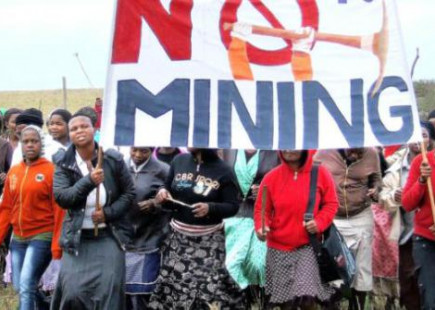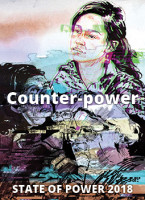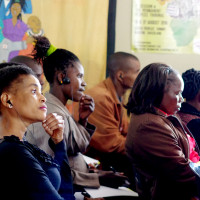Land is the only thing we have - for us and for future generations An interview with Nonhle Mbuthuma
Topics
Regions
Nonhle Mbuthuma talks about the resilience of her people in Pondoland, fighting for their land and livelihoods against corporate mining interests.

Nonhle Mbuthuma is co-founder of the Amadiba Crisis Committee set up in 2007 to fight a titanium mining project that an Australian mining firm (Mineral Commodities (MRC) seeks to impose on her region of Pondoland in South Africa’s Eastern Cape.
The proposed project would be one of the largest titanium mines in South Africa and would affect hundreds of households as well as a coastal region known for its incredible beauty and unique biodiversity. The project has received strong central government backing and has divided communities and led to the murder of one prominent activist, Sikhosiphi 'Bazooka' Rhadebe and the deaths of several others in suspicious circumstances.
At two sessions of the Southern African Permanent Peoples Tribunal, the project was cited as an example of the impunity of mining corporations that commit crimes against with the complicity of the state, but also as evidence of the incredible strength and resilience of the communities that resist. The project has been temporarily halted on numerous occasions due to public pressure, most recently by Mining Minister Zwane in June 2017. However the government has demonstrated time-and-again that it is determined to impose the project, so the Amadiba Crisis Committee continues to fight to stop the project and once-and-for all.
1. How did you become involved in struggles for social and environmental justice?
Honestly sometimes I don’t know how I got involved. But I know I was influenced by my ancestors and elders. My grandfather was part of the MPondo revolt (the first substantial uprising against apartheid in 1960-1962) and he always told me stories about how they managed to protect the land before there was any democracy. He and other elders taught me the importance of the land, that it is the only thing we have, that it is the only thing we have to share with future generations and that once it’s gone no compensation will be enough. So as soon as I heard about the mining project, I thought of the stories of my grandfather. That’s how I got involved, but I also know it’s not about fighting for myself, it’s about my community and the next generations.
I think I first heard about the project in 2000 when I was still at school. A white guy came here promising development for the community. My grandfather was part of the traditional authorities and warned of the dangers of losing land but said it was up to our generation to decide. So I and other started attending meetings in the community, asking questions such as how we would get water, how we would graze animals if the mining went ahead. The guys proposing the project didn’t answer our questions. He ended up inviting some people in the community to see another mining project in Richards Bay, where he plied them with alcohol (just like the Apartheid authorities used to do), buying them clothes and watches, and choosing one person to report back to our community to say that it was all good and that everyone in Richards Bay was rich. It was obvious that this was not true as we learned about the likely environmental and social impacts.

Dick Forslund
So we started to organise ourselves, forming a committee, the Amadiba Crisis Committee in 2007 to show the government we rejected the project and that our rights were being violated. The Department of Minerals and Energy granted mining rights to the company, but we said we won’t back down. We appealed the decision and got more organised, reaching out to the media, getting support from pro-bono lawyers, working with NGOs. We succeeded in temporarily blocking the project at the end of 2008.
In 2015, the government sought to impose the project again regardless of community opposition. That’s when we took the decision to stop the company from even doing exploratory studies or impact assessments. So when they sent employees in convoys, we blocked them with our bodies. They responded with violence, even killing one of our leaders, Bazooka, thinking it would end our struggle. But instead people became more active and courageous. It even turned some of those who had been in favour of the mining, who started to question how it could be a good thing if people are dying. Since the assassination of Bazooka, there have been no arrests and investigations have been blocked. It means we trust nobody except ourselves.
2. What do you consider the key ingredients for building movements that can challenge established power and build alternatives?
I think the key is to be honest and transparent and mobilised – believing that we are fighting not just for ourselves but also for future generations. It is also critical to put women at the front of the struggle. If you look at our struggle, it is mainly led by women – they don’t change minds so easily. We also know the community cannot be dependent on anybody, except itself. We know that the government is working hand-in-hand with companies to oppress our communities, so we have to make it impossible for them to work. That’s why we don’t even dialogue, because we tell them we are not interested in their project. Our stand is to say no. The government likes to talk about consultation in order to divide our communities, but this is just a tick in the box. We are demanding the right to say no – what we need is Free Prior and Informed Consent and we are fighting for this. This year in April 2018, we will have a court case, the first in South Africa, to claim this right. If we win the case, it will help other communities. But even if we lose the case or the government proceeds, we will keep fighting regardless to defend our land.
It has also been important for our campaign to get the message out and build solidarity with others. It is difficult in a rural area for people to know what is happening so we need help to pass the message to the media, and build solidarity with other NGOs. If we are just talking here and others don’t know, the struggle will never reach the whole world. We believe you build your house because of other people so this interdependence is crucial.
3. How do you remain mobilised when faced with such state and corporate repression?
For us, when we saw the bloodshed, it was like putting petrol on the fire. It mobilised us rather than made us afraid. We became more angry, realising that if we turned back, we would be selling out those who died defending the same land. We say that this won’t work, they will have to kill all of us. We cannot compromise with those who shed blood. They made a huge mistake.
4. How do we ensure our counter-power is not co-opted or worse replicate oppressive structures of power?
When I think back of those who fought for democracy, I have tears in my eyes, because those same people instead of protecting us are oppressing us and making our lives so difficult. Honestly, we just hope that what is happening with the ANC is a big lesson. It is not what our ancestors fought for. I hope one day the ANC will understand that as rural areas we fought for this democracy. Yet when we oppose destructive money they call us ‘anti-development’ and treat us as enemies. They should talk to us. The lessons are that we need to sustain our movements and keep them away from money. If movements become about making money, then it will end your struggle, you will lose your focus and forget what you fight for.
5. You said women were at the forefront of movements? Why was this? What should be the legacy for our movements and society?
I think women have led this movement, because they will be most affected if mining takes place They won’t work there, they will need to feed their children, to find clean water - they know what the consequences of mining will look like. Women are also not afraid to stand up; they stick to their beliefs and are not easily bought off. In the anti-apartheid struggle, it was women who led the struggles against the ‘pass laws’ and they are now leading the struggle against this mine. It’s not easy having to think about children, cook, care for the family at the same time as struggling. But women can do that.
6. What is your vision for Pondoland?
Mining is called development, but it is really a monster and a huge one. It is not development when you lose everything. It is not development when you are left with contaminated water, when your livelihood is lost. We know in Pondoland that there are alternatives. We must invest in agriculture because it is sustainable – and I don’t mean agriculture where one farmer owns thousands of hectares but community agriculture. Tourism is also an option here because it is so beautiful, but it must be community-led and integrated into our lives, based on our work and involving the cultural activities that we already have. It will need to be done carefully so as not to change our way of living. The government says we are anti-development because we dare to tell them what we want because we know ourselves. Do we not know what is good for us?


